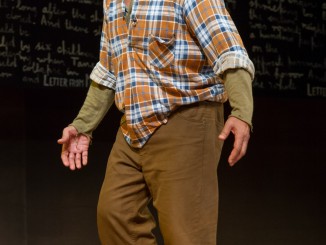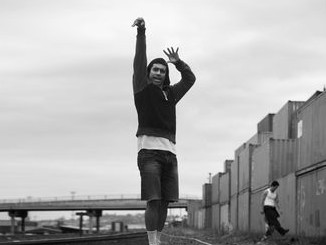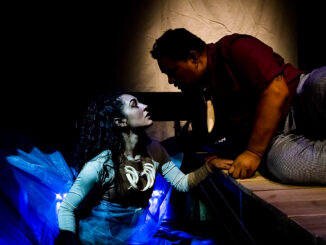
Hill of Memory [by James Wenley]

“More of a murky puddle than a fresh water spring” is how Whiti (Rob Mokaraka) describes trying to look back into his past. Taki Rua’s new work, Pūtōrino Hill by Chris Molloy by is a captivating memory play where the past’s reflection is a murky place indeed, revealing curses, hushed up scandals, patupaiarehe (fairies) demons. When your turangawaewae is cursed, what are the foundations on which you stand on?
A researcher, Sarah (Lana Garland) has come to the rural Reinga to research its history and myths. She knows of the stories of the patupaiarehe and ancient tapu that has cursed the land, and the prophecy of a lost pūtōrino (flute). She’s come to kaumatau Whiti for his oral testimony.
No longer a “spring kumara”, Rob Mokaraka’s old Whiti is a beguiling figure, who is charming and sincere in the present, but when his eyes go blank, slips into the terrain of his interior. This is how he is when Sarah, and we, first meet him, a long introduction in which he shuffles forward as if in a trance, until Whiti breaks the silence – “away with the fairies again nē”. Mokaraka gives a remarkable performance, believably crumbling into the skin of someone much older, Whiti’s mana radiates out of Mokaraka.
Director Te Kohe Tuhaka fully explores the theatrical potential in Malloy’s script of Whiti witnessing the events from his past, as actors Jade Daniels as Young Whiti and Kim Garrett as childhood friend Hana replay the formative events of his childhood (the only period when, Whiti says, you are fully engaged with the here and now).with the here and now”. Whiti looks on through empty picture frames hanging in rows from the Loft roof stage left, Sarah watching Whiti with anxiousness and intrigue, trying to see what he sees.
While an older kaumatua could have been cast at Old Whiti, Mokaraka’s slippage through time and transformation into Whiti’s Koro, a religious leader, really makes this wonderful casting. Koro is a charismatic preacher, in touch with his community, and clearly very proud of his young mokopuna. Nervous young Whiti is invited by his Koro to speak to the congregation, and Whiti talks of his prophetic visions – God has spoken to him. Whiti is burdened with the role of chosen one – the one to end the ancient tapu, to restore balance. The meatworks won’t close, he declares.
As the interview and memories continue, Whiti grapples with his faith, spirits, and seeing his hero, Koro, tarnished.
Matthew Eller’s thriller-inspired sound design unsettles with a darkness rumbling underneath the action. Nick Zwart’s lighting design brings past and present together, and uses fast flash transitions to keep the audience on edge. A cluster of lights Brian King’s costumes give a strong feel of the period, Mokaraka’s being a key design that can exist in both. King’s set makes excellent use of Q Loft’s depth.
As Old Whiti wants to tell his story, and Sarah doesn’t know what it is she is really trying to find out, the dramatic stakes between the pair do not register as highly as they potentially could. After the tense build-up of the past-story, the revelation and ending arrives with a quickness that means healing, and catharsis, is not quite achieved. On the other hand, it means Pūtōrino Hill continues to hold a power that tugs away at you long into the night.
Pūtōrino Hill is presented by Taki Rua and plays at Q Loft until 19 July. Details see Q.




Leave a Reply